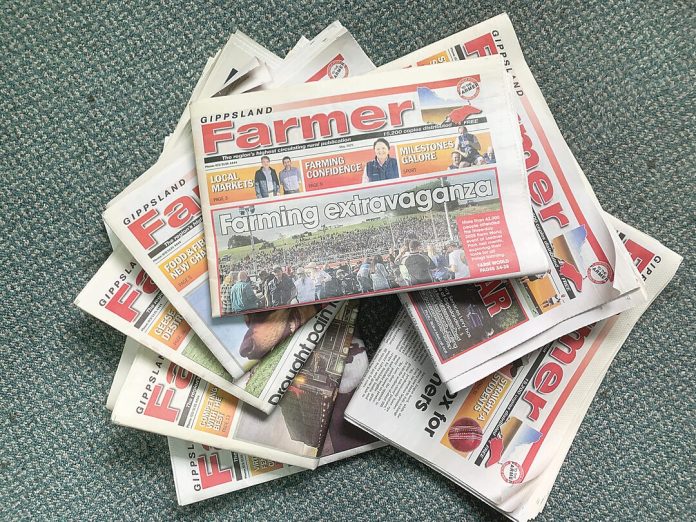
By AIDAN KNIGHT and LIAM DURKIN
THE world truly has gone mad.
In a move that defies reason and regional reality, Gippsland Farmer, the region’s highest-circulating rural publication, has been reduced considerably in size after a bureaucratic blunder from Australia Post headquarters.
For the Christmas period across November and December, Australia Post says it will not deliver copies of the Latrobe Valley Express-produced monthly newspaper to rural letterboxes unless each copy weighs less than 100 grams.
Usually, Gippsland Farmer is at least 48 pages, coming in at around 130 grams.
In order to meet the 100gm weight limit, the Express has to cut the next two issues of Gippsland Farmer to 36 pages.
For a service once trusted to bridge the tyranny of distance, Australia Post’s latest directive seems determined to widen it.
The Express, responsible for producing and printing Gippsland Farmer, received the sudden notification last week.
In email correspondence, Australia Post said they were “happy to help (Gippsland Farmer) connect to the community”, but were “really sorry to advise you that we will not be able to deliver any unaddressed mail article over 100gm during 03/11/2025 to 05/01/2026 due to our peak time delivery arrangements”.
An abrupt, paradoxical message, detailing an issue that has never been experienced previously in the more than 40 years the Express has been distributing Gippsland Farmer, now at a 16,600 circulation, as part of the Provincial Press Group.
Latrobe Valley Express journalist Katrina Brandon, who oversees Gippsland Farmer editorial, was gobsmacked.
“I am incredibly disappointed in Australia Post’s decision,” she lamented.
“Losing pages for Gippsland Farmer because Australia Post imposes a weight limit on our product has affected everyone.
“Not everyone has the luxury of online content and social media to get their news, and for farmers, newspapers such as Gippsland Farmer are relied on for news that could benefit their farms, such as new equipment or livestock research.”
Express/Gippsland Farmer advertising consultant Paula Hansen added her frustrations.
“We were absolutely devastated when we found out,” she said.
“We had already filled 48 pages, and they wouldn’t even consider other options to get it delivered; they just flatly refused to do it.
“I understand that Christmas is a very busy time but to let us know on deadline day beggars belief.
“Our journalists do a fantastic job and work really hard to publish articles that keep our farming community engaged and informed, and we had already reduced the paper from 52 pages to 48 each month to keep rising Australia Post costs down.”
The changes mean the November and December issues will be drastically slimmed down, forcing editors to cut valuable community content – including coverage of agricultural innovation, local events, and fire preparedness stories that many rural readers depend on.
Gippsland Farmer Advertising Consultant Janeen Brown said the policy change has undone years of hard work building a trusted publication for the region.
“My fellow advertising consultant Paula Hansen, our invaluable editorial team and I have worked tirelessly to create a newspaper that we are proud to deliver to rural Gippslanders,” Ms Brown said.
“During COVID, the Victorian government deemed us an essential service, yet on the morning of Thursday 23 October, a federal government-owned corporation forced us to minimise the amount of content that we can deliver.
“This last-minute decision caused us to reduce the pages within our November edition. As we had already sold advertising space that had to be included, we then had to reduce the amount of editorial space.”
The timing could hardly be worse.
With harvests underway and bushfire warnings escalating, cutting off regional mail delivery for print news is more than an inconvenience – it’s a blow to the flow of information in communities that depend on it most.
At a time when misinformation spreads faster than fact online, Gippsland Farmer is being punished for printing the truth on paper.
“Now we are forced to present something with hardly any news in it, that we are not proud of, and we feel that we have let our journalists down,” Ms Hansen added.
Express Printing Manager Peter Giles said while he appreciated the professionalism of Australia Post staff he had worked with, he was disappointed by the lack of communication from higher up.
“Everyone I’ve dealt with at Australia Post has been empathetic and fantastic,” he said.
“But the email we received was abrupt and non-negotiable. It caused a lot of stress, especially for staff who take pride in getting the paper out every month.”
Mr Giles said he was later told the delivery restrictions had been noted on Australia Post’s website, but felt the communication channels could have been clearer.
“We’ve had a long, direct relationship with Australia Post,” he said.
“It’s surprising that a company of this size wouldn’t issue a formal notice or direct email to regular clients about such a major operational change. We would have worked around it – if only we’d known sooner.”
Mr Giles is awaiting further response from Australia Post this week, hoping to explore potential compromises for a reduced service over the Christmas period for a publication that is delivered free to the public for the benefit of rural communities.
While the Express understands the pressures of Australia Post’s busy Christmas schedule, the decision highlights the growing challenge of delivering rural news to areas that still depend on traditional print.











